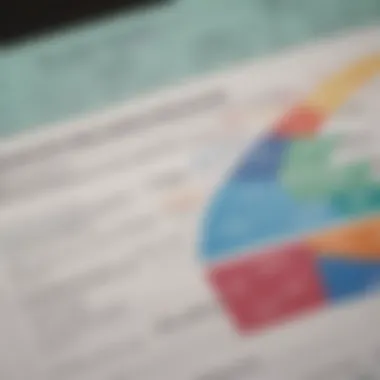Navigating the Financial Landscape of a 250k Mortgage


Intro
Navigating the realm of home financing can feel like deciphering a complex puzzle, particularly when the stakes are as high as a 250k mortgage payment. With so many moving parts involved, it's essential to peel back the layers and understand how various elements interplay, influencing both immediate and long-term financial health. This article takes a comprehensive look at the financial implications tied to a mortgage of this size.
Mortgage payments are more than just a fixed sum you pay each month; they represent a significant portion of your financial commitment. Making sense of the ins and outs—from interest rates to amortization periods—can empower you not just to make payments, but to navigate through your financial landscape with confidence.
Overview of Financial Product
Definition
A mortgage is essentially a loan secured by the property itself. Should the borrower default, the lender has the right to seize the property. With a 250k mortgage, borrowers must pay attention to interest, terms, and various fees that can add up over the life of the loan.
Key Features
- Repayment Terms: Usually structured over 15 to 30 years.
- Interest Rates: Can be fixed or adjustable, affecting monthly payments.
- Amortization Schedule: Determines how principal and interest are paid off over time.
Purpose and Benefits
Taking out a mortgage allows homeowners the means to purchase property without needing the full cash upfront. This financial leverage can lead to home ownership while enabling capital to be invested elsewhere.
Types and Categories
Mortgage Types
- Fixed-Rate Mortgages: Stability in repayments, ideal for long-term planning.
- Adjustable-Rate Mortgages (ARMs): Lower initial rates that can rise over time—suitable for those who may move before rates reset.
- Interest-Only Mortgages: Lower initial payments but can lead to larger principal payments later.
Pros and Cons
- Fixed-Rate:
- ARMs:
- Pros: Predictable payments, good for budgeting.
- Cons: Higher starting rates than ARMs.
- Pros: Lower rates for initial terms.
- Cons: Uncertainty in future payments.
Situational Uses
Choosing the right mortgage might depend on various situations:
- First-time homebuyers often prefer fixed rates for stability.
- Investors might lean towards ARMs for lower initial costs.
Costs and Fees
Types of Fees Associated
- Origination Fees: Charged by lenders to process the loan.
- Application Fees: Covers the cost of credit checks and processing.
- Closing Costs: Include appraisal, title insurance, and various administrative charges.
Interest Rates and APR for Loans/Cards
Understanding the difference between the nominal interest rate and APR is crucial. The APR reflects not just interest but also other costs associated with obtaining the mortgage. Keeping a close eye on both helps in comparing offers effectively.
Closing Costs for Mortgages
These can amount to several percent of the loan, significantly impacting the initial outlay required to finalize the purchase. Common closing costs include:
- Title search fees
- Document preparation fees
- Prepaid expenses
"Always factor in closing costs when budgeting for a home purchase. They can be as vital as the down payment itself."
Finale
Prolusion to Mortgage Payments
Understanding mortgage payments is crucial for anyone venturing into the world of home financing, especially when dealing with a significant amount like a 250k mortgage. This section highlights the fundamental components that make up a mortgage payment and why grasping these concepts can be beneficial for borrowers.
When you take on a mortgage, you’re not just signing a contract. You’re making a long-term financial commitment that has implications for your budget, savings, and future financial goals. The intricacies of the payment structures can either ease your financial journey or complicate it, making it necessary to approach this with clear insight.
Definition of a Mortgage Payment
A mortgage payment primarily consists of several components: the principal, interest, taxes, and insurance, often abbreviated as PITI.
- Principal is the portion that goes towards paying off the loan amount itself. For instance, if you borrow $250,000, each payment reduces this balance, steadily increasing your stake in the property.
- Interest is the cost of borrowing the funds. Various factors influence the interest rate you receive, including your credit score and the prevailing market rates. It’s important to note that this cost can change over the life of the loan, particularly with adjustable-rate mortgages.
- Taxes refer to property taxes, which are assessed by the local government and are typically included in the monthly payment. This ensures that taxes are paid on time, preventing any potential legal issues down the line.
- Insurance protects both the lender and the homeowner. Homeowners insurance covers damages to the property, while mortgage insurance applies to loans where the down payment is less than 20%.
Understanding these components allows borrowers to budget effectively and anticipate costs.


Importance of Understanding Payment Terms
Knowing the terms of your mortgage payment can be the difference between financial stability and stress. Different loans come with various features such as fixed or variable interest rates, and the choice between a 15-year or 30-year term can significantly affect your monthly obligations.
Why is this important?
- Financial Planning: Clearly understanding what affects your mortgage payment helps in planning your monthly budget.
- Adaptability: A good grasp of your mortgage terms allows you to adjust your finances as conditions change, such as fluctuations in interest rates.
- Long-Term Considerations: A 250k mortgage can tie up a significant part of your finances for years. Understanding the implications allows you to weigh your options carefully, ensuring these choices align with your long-term goals.
"A dollar saved through knowledge is far more valuable than a dollar earned through effort without understanding."
Grasping the fundamentals of mortgage payments sets the stage for more nuanced discussions related to the intricacies of managing your home loan. It arms potential homeowners and current borrowers with the knowledge needed to navigate their financial future more confidently.
Overview of a 250k Mortgage
When it comes to purchasing a home, many factors come into play, especially regarding mortgages. A mortgage of $250,000 is a significant financial commitment and warrants a thorough understanding of its implications. This section sheds light on the role of a $250k mortgage, providing insights not just about numbers but about the real-life applications of such a loan and the common profiles of those who typically seek it.
Typical Usage of 250k Mortgages
$250,000 mortgages often serve as the backbone for many first-time homebuyers, young families, or even downsizing retirees. This amount is typical in many suburban areas, enabling individuals and families to secure homes that fit their needs without stretching their finances to the breaking point.
While this figure may boast a comparatively modest price tag in some markets, it still demands serious consideration across various aspects of personal finance.
In urban settings, it's common for homes to cost much more. As such, a $250k mortgage may cater to:
- Single-family homes: These are often preferred by families seeking more space rather than cramped apartments.
- Condos or townhomes: These options can sometimes provide an affordable means to enter the housing market without the responsibility of maintaining a yard.
- Investment properties: Some buyers aim for a property that allows them to earn rental income, thus providing financial flexibility.
Each of these choices hinges on an individual's financial strategy and needs.
Common Borrowers and Their Needs
The profile of a borrower who seeks a $250k mortgage is often quite diverse. Young professionals starting their careers might consider this investment as a step toward financial independence. In contrast, families may look for stable, long-term residence to raise children, where schools and community resources are readily accessible.
Some of the typical needs and motivations include:
- Affordability: The goal is to find a mortgage that fits within a reasonable budget. This requires thoughtful calculation of ongoing costs, such as interest payments, property taxes, and homeowner's insurance.
- Equity building: Homeownership serves as a financial strategy for many, as mortgage payments contribute to growing equity—allowing homeowners to build wealth over time.
- Stability: In a constantly shifting rental market, owning a home provides a sense of permanence, potential for customization, and control over living conditions. Many view this as an antidote against rising rents.
"Investing in a $250k mortgage is about more than just the house; it's about planning a lifestyle that aligns with future aspirations."
Understanding the motivations behind seeking a $250,000 mortgage lays the groundwork for further discussions on calculations and strategies in subsequent sections. It's essential to match one's financial plan with individual goals, ensuring a thoughtful approach to homeownership.
Calculating the Monthly Payment
Understanding how to calculate your monthly mortgage payment is key in managing a 250k mortgage. It’s not just about paying each month; it’s about foresight, planning, and securing your financial future. As a potential homeowner, grasping the components that contribute to these payments is a must. Knowing what to expect helps avoid those nasty surprises down the road.
Principal and Interest Components
At its core, the monthly payment comprises two primary elements: principal and interest. The principal is the original loan amount, while interest is the cost of borrowing money.
Over time, a typical mortgage payment will chip away at the principal while covering interest costs. Initially, a larger portion of your payment goes toward interest, gradually shifting to more principal as the loan matures. Here's why this is important:
- Early payments can feel heavier: If you’re just starting out, be prepared for higher interest fees that eat into your monthly costs.
- Building equity: Each payment brings you closer to homeownership by increasing your equity. Equity is essentially the part of the home you truly own.
This shifting dynamic, while simple in theory, can lead to complex feelings about your progress in homeownership. Watching your equity rise over time can be motivating, especially for young professionals wanting a clear picture of their investment.
Inclusion of Taxes and Insurance
Don’t forget that what you pay monthly is not restricted to just principal and interest. You’ll also need to account for taxes and insurance. Property taxes, often rolled into monthly payments through an escrow account, ensure that you're not stung with a hefty bill during tax season. Homeowners insurance protects your property from unforeseen disasters. Here's how these factors play into your payment:
- Tax assessments may fluctuate: Depending on local policies, your property tax rates can change, potentially altering your monthly outlay.
- Insurance costs can vary too: Different insurance providers will offer various rates for coverage, leading to another layer of variability in your monthly cost.
It's crucial to stay on top of these costs to avoid bumping into unexpected hikes. For families and young homeowners, getting a handle on these expenses can make a world of difference in budgeting.
Using Mortgage Calculators
With today's technology, calculating your monthly mortgage doesn’t need to be a Herculean task. Online mortgage calculators are invaluable tools that can lay out your payment structure in a jiffy. Just input the loan amount, interest rate, and loan term, and you’ll have a clear picture. Some benefits include:
- Fast Results: No need to tweak formulas on a calculator; just a few clicks and you're set.
- Scenario Testing: Want to see how different interest rates affect your payment? You can quickly run simulations.
- Budget Planning: By entering your potential payment amounts, you can adequately plan your finances, ensuring you can maintain a balanced lifestyle despite mortgage commitments.
Using a mortgage calculator can feel like having a crystal ball into your financial future, giving insight into how your payments will shift over time.
Factors Influencing Mortgage Payments
Understanding mortgage payments, especially when it comes to a substantial amount like a 250k mortgage, involves taking a closer look at various factors that can impact one’s financial obligations over the term of the loan. These elements do not simply dictate how much you will pay each month; they also determine the overall cost of borrowing, which can have long-lasting implications for personal finances. Here are the primary considerations.
Interest Rates


Interest rates play a pivotal role in determining the size of your monthly mortgage payment. A higher interest rate means you're paying more money on the borrowed amount, which translates onto higher monthly obligations. Conversely, lower interest rates can alleviate your burden, making it easier to manage payments.
Fixed rates and adjustable rates come into play here. With a fixed interest rate, your payment remains unchanged, providing predictable budgeting over time. However, adjustable rates can fluctuate after a period, potentially increasing costs when market rates rise. Knowing which option fits your financial strategy best is crucial. For example, if you plan to stay in your home for a long period, a fixed-rate mortgage might be more beneficial compared to an adjustable-rate mortgage.
Amortization Periods
The amortization period is essentially the lifespan of your loan, commonly spanning 15, 20, or 30 years. This duration significantly influences both your monthly payment and total interest paid. A shorter amortization period leads to higher monthly payments, reducing interest over the loan's life. This can be favorable for those who aim to own their home outright more quickly, but it might stretch budgets thin in the short term.
On the other hand, extending the amortization can lower monthly payments, which helps with cash flow. However, this can lead to paying much more in interest over time. It's necessary to strike a balance that aligns with both current cash needs and long-term financial health. In tough economic climates, the choice of amortization can mean the difference between making payments comfortably or struggling financially.
Credit Scores and Their Impact
Your credit score is not just a number; it fundamentally impacts your mortgage prospects. Lenders view higher scores as a sign of reliability, which can open doors to lower interest rates and better loan terms. On the flip side, a lower score can lead to higher interest rates, ultimately driving up your mortgage payment.
Improving your credit score before applying for a mortgage can save you a considerable amount over the life of the loan. Efforts such as paying down existing debts, avoiding new loans, and ensuring timely payments on all bills can contribute to enhancing your credit. This process can be time-consuming but well worth the effort when the stakes involve a hefty mortgage.
"Maintaining a healthy credit score acts as a safety net, allowing better access to financial products at lower costs."
In summary, when taking on a 250k mortgage payment, understanding these key factors – interest rates, amortization periods, and credit scores – can better position you for success. Careful consideration of how each of these affects monthly obligations not only helps in selecting the right loan but also fortifies your long-term financial planning strategy. Pay attention to every nuance, and it could mean a healthier financial future.
Repayment Strategies
When it comes to navigating the waters of a 250k mortgage payment, understanding repayment strategies is of utmost importance. Choices made in repayment can have a significant impact on financial health, and help set the course for a lifetime of home ownership. While the house is often the star of the show, the repayment strategy needs to be front and center in your financial planning.
One of the key benefits of a solid repayment strategy is the ability to manage cash flow efficiently. Sinking monthly payments can have an emotional toll, so being aware of different options can alleviate some stress. It ensures that borrowers are not just treading water but actively moving toward their financial goals.
Standard Repayment Plans
Standard repayment plans are perhaps the most straightforward way to chip away at your mortgage. With this plan, borrowers pay equal monthly installments until the loan is retired. The structure can be appealing because it's predictable and easy to budget for. Generally, these loans take around 15-30 years to fully amortize, depending on the lender and agreement.
- Predictable Payments: Monthly payments won’t change, making it easier to plan financial commitments.
- Building Equity: Among the benefits is the steady build-up of equity in the home over time.
- Long-term Financial Security: Many find comfort in knowing payments will not rise, making it easier to plan for other life events.
Extra Payments and Accelerated Options
If you feel financially secure and want to tackle that mortgage with zeal, you might want to explore options for making extra payments or going for an accelerated repayment plan. These strategies allow borrowers to conserve interest costs over the life of the loan and can lead to homeowners pausing their mortgage payments earlier than planned.
- Monthly Increase: Making higher monthly payments can slash years off your mortgage. For example, an extra $100 a month might seem small but could potentially save thousands in interest over time.
- Lump-Sum Payments: Windfalls such as tax returns or bonuses can be applied directly to the principal, lightening the load.
- Bi-weekly Payments: This can effectively turn a 30-year mortgage into a 26-year commitment, which makes a big difference in the long run.
Consider carefully what fits your financial landscape. Important to note, paying extra can provide flexibility but may also lock in funds that might be needed elsewhere. As Ted, a young professional from Denver, put it, "It felt great to watch that balance drop, but I had to remember the car payments and other bills!"
Refinancing Opportunities
Exploring refinancing options is another strategy that should feature prominently in your mortgage game plan. Life throws curveballs, and interest rates are a big factor in determining overall financial wellbeing. By refinancing, homeowners can often replace their existing loan with a new one that has better terms, lower payments, or a shorter duration.
- Lower Interest Rates: Taking advantage of falling interest rates can lead to substantial savings.
- Shorter Loan Terms: Switching to a shorter-term loan can save substantially on interest, albeit at the expense of higher monthly payments.
- Cash-Out Refinancing: This can offer immediate funds for large expenses or future investments. However, the added debt requires careful consideration.
As you navigate this significant investment, weigh your choices wisely. Your repayment strategy might just be the cornerstone of your financial future.
Long-Term Financial Planning
Long-term financial planning is a critical aspect when dealing with a 250k mortgage payment. It serves as a guiding principle that helps individuals and families shape their financial futures. Not merely about calculating monthly payments, long-term planning involves evaluating how this mortgage fits into a broader financial landscape, considering factors like savings, investments, and lifestyle aspirations.
Impact on Personal Finances
Taking on a mortgage, especially one that amounts to $250,000, has a profound impact on personal finances. At its core, this obligation demands a significant chunk of your income. Consider this: a typical monthly mortgage payment can eat up 25% to 30% of a borrower's take-home pay. That’s a sizeable portion, especially when you factor in other costs like utilities, groceries, and other debts.
As a result, understanding how this financial commitment alters your existing budget is crucial. You might find areas where cuts become necessary, or perhaps you need to re-evaluate your spending habits. For instance, if you enjoy dining out, that might need to take a backseat for a while. Prioritizing payments and managing discretionary spending is essential for maintaining financial health.
The Role of Equity in Housing
Equity, the portion of the home that you own versus what you owe to your lender, plays a fundamental role in your financial equation. As home values increase, so does your equity. This represents a financial buffer, a kind of safety net, should the unexpected occur.
- Building Equity: With each mortgage payment, a part goes toward reducing the principal. The more you pay off over time, the more equity you build.
- Refinancing Opportunities: Increased equity can open up doors for refinancing your mortgage to potentially secure lower rates.
- Investment Potential: Home equity can be tapped into for family milestones or major purchases, turning it into liquid cash through home equity loans or lines of credit.
This makes understanding equity not just about ownership but about leveraging your investment wisely.
Integration with Overall Financial Goals
Lastly, integrating mortgage obligations with overall financial goals is pivotal for long-term planning. It’s not enough to see the mortgage as a separate entity, but rather as part of a larger financial narrative.
- Future Goals Alignment: Whether it’s saving for a child’s education or a retirement fund, ensure your mortgage fits within those goals. For instance, a larger mortgage payment now might mean less available for retirement savings.
- Emergency Funds: It's wise to have a safety net in place. Establishing an emergency fund should be part of your mortgage planning to handle unexpected repairs or financial downturns without jeopardizing your mortgage.
- Investment in Education: Think ahead regarding education savings for children or your own professional development. A mortgage shouldn't hinder that progress.
After all, buying a home is a significant milestone, but it shouldn’t put your entire financial future on the line.


"The key to successful long-term financial planning is not simply about numbers; it's about understanding how those numbers fit into your life."
In summary, thoughtful long-term financial planning allows homeowners to navigate through their 250k mortgage payment effectively. It requires balancing personal expenses, understanding equity, and ensuring that home financing aligns with broader life goals.
Cost Considerations
Understanding the financial implications of a 250k mortgage goes beyond just crunching numbers. One significant aspect to grasp here is the concept of cost considerations. Committing to a mortgage isn't merely about the monthly payments you’ll face. Rather, it's a balancing act that involves evaluating both tangible and intangible costs that can shape your long-term financial landscape. Ignoring these could be like sailing a ship without checking the winds—you might end up off course or even stranded.
Opportunity Costs of Committing to a Mortgage
When you take on a mortgage, you’re not just making a commitment to pay back that amount over time; you're also choosing to allocate your resources in a particular way. Opportunity cost refers to what you give up in choosing one option over another. For instance, if you allocate a significant chunk of your income towards a mortgage, you might have to sideline plans to invest in stocks, start a business, or save for your children's education. Every decision has its shadow.
Here are some critical factors to bear in mind regarding opportunity costs:
- Investment returns: Money put toward a mortgage payment could potentially yield better returns in stocks or retirement accounts.
- Liquidity concerns: A huge mortgage ties up cash that could otherwise be available for emergencies or other pressing financial needs.
- Lifestyle constraints: High mortgage payments may limit your ability to travel, enjoy leisure activities, or even indulge in personal hobbies.
Weighing these costs gives a clearer picture of how mortgage commitments might impact your freedom to make other choices in life. Opportunity costs bring a reality check; it’s about how you envision your global spending strategy.
Hidden Costs of Homeownership
Beyond the obvious monthly payment, hidden costs can sneak up on you—a bit like finding out that your buddy who promised to help with the move actually forgot to bring his truck. Here’s a rundown of costs you might not think about at first glance but can seriously affect your wallet:
- Maintenance and Repairs: From a leaky roof to broken heating systems, home repairs can add up quickly. It's wise to set aside a percentage of your income for maintenance expenses.
- Property Taxes: These can vary widely depending on your area. Always factor in potential increases in your budget.
- Homeowners Insurance: This protects your abode from unforeseen disasters, but it’s also an ongoing cost that shouldn’t be overlooked.
- Association Fees: If you're part of a homeowners association, be ready for monthly fees that cover communal amenities.
Taking the time to consider these hidden costs can set the right stage for your financial expectations.
"A mortgage is about more than just payments; it's a comprehensive financial strategy that includes considering opportunity and hidden costs."
The journey of homeownership can be filled with unforeseen bumps. By keeping these considerations at the forefront, you’ll be better positioned to navigate the ups and downs of your mortgage experience. Remember, having clarity can help you chart a smoother course.
Current Trends in Mortgage Markets
Understanding trends in the mortgage market is crucial for anyone navigating a financial commitment such as a 250k mortgage payment. With mortgages representing significant long-term financial obligations, the landscape can change as rapidly as a cat on a hot tin roof.
Keeping an eye on market fluctuations and government policies can reveal a wealth of insights about borrowing, affordability, and homeownership opportunities. This section will explore how these elements can affect not only current borrowers but also those considering entering the market.
Market Fluctuations and Their Effects
Market fluctuations can feel like a relentless roller coaster, driving interest rates and housing prices up and down. For individuals grappling with a mortgage, understanding these shifts is essential. The fluctuation of interest rates, for example, can have a ripple effect on monthly payments, affecting budgets and financial planning.
- Interest Rate Trends: When interest rates dip, it creates a golden opportunity for refinancing existing loans or securing lower monthly payments for new buyers. Conversely, when rates rise, it may become financially burdensome, tightening consumers' budgets significantly.
- Housing Market Price Changes: Changes in housing prices can directly influence the overall financial picture. If property values climb steadily, a homeowner can potentially benefit from increased home equity. This has positive implications for future refinancing and borrowing against the home.
Here's a thought to ponder: "What happens to affordability when price escalation outpaces wage growth?" It can shift the entire mortgage thought process toward adjustable-rate mortgages, which are more appealing in a fluctuating economy.
Government Policies Affecting Mortgages
Government policies can make or break the landscape of homeownership. They can impact interest rates, lending criteria, and even the availability of mortgage options. Key policies often include:
- Federal Reserve Actions: Decisions made by the Federal Reserve, especially regarding interest rates, trickle down into mortgage rates. Changes can lead to either a windfall or a headache for borrowers, depending on their timing.
- Tax Deductions and Credits: Homeownership can be a more attractive option with the right tax incentives in place. For instance, tax deductions on mortgage interest can ease the financial load for many homeowners. Keeping track of proposed changes is vital, as alterations could shift the balance in individuals' favor or against it.
- Regulation Changes: Regulatory measures can influence eligibility for loans, affecting how easily households can access mortgages. Keeping informed about adjustments to underwriting criteria and lending practices is crucial for anyone looking to secure financing.
Take Notice: Being aware of government interventions can lead to better timing when applying for a mortgage, potentially saving thousands over the life of the loan.
In summary, staying informed about current trends in the mortgage market allows potential homeowners and current borrowers to maneuver through an ever-changing financial landscape, ensuring they make informed and strategic decisions about their mortgage payments. These insights will empower readers to anticipate changes and adapt their strategies accordingly.
End and Future Outlook
Navigating the landscape of a 250k mortgage payment is no small feat. Whether you're a young professional just starting out or a family looking to settle into a new home, understanding the financial implications is crucial. This section seeks to tie together the various threads discussed throughout the article, emphasizing how financial awareness can help you make informed decisions that resonate with your long-term goals.
The significance of the topics we've explored resonates deeply in the current mortgage climate. With interest rates on the rise, knowing how to manage your payments effectively becomes all the more essential. Grasping the nuances of amortization periods and repayment strategies allows you to tailor your financial journey. You’re not just filling a financial obligation; you’re actively shaping your future.
"Knowledge is power, and when it comes to mortgages, that couldn't be more true."
As we pull all these elements together, a few clear benefits come to the forefront:
- Financial Awareness: Comprehending how a mortgage fits into your overall financial picture enables better decision-making.
- Goal Alignment: Understanding the variables helps align mortgage commitments with future aspirations, be it buying a larger home, funding your children's education, or planning for retirement.
- Mitigation of Risk: Being informed on refinancing options and market trends can help you pivot effectively, should unexpected circumstances arise.
Each of these factors plays into the broader picture of what it means to live with a 250k mortgage payment, and being aware can allow you to act wisely.
Summary of Key Takeaways
In reviewing the major themes of the article, a couple of key takeaways stand out. Firstly, the interplay between interest rates and the length of your mortgage can significantly affect your overall financial health. A higher rate could lead to long-term pain, while locking in a lower rate can pave the way for savings over time. Secondly, it's imperative to factor in all hidden costs related to home ownership, such as property taxes, insurance, and maintenance, as these can dramatically impact your budget.
It's wise to approach your mortgage as a multifaceted financial tool rather than a mere obligation. Pay attention to how decisions made today will echo throughout your financial future.
Predictions for Mortgage Payments in the Coming Years
Looking ahead, the mortgage landscape is bound to evolve. A few trends are already taking shape that might alter how individuals approach their mortgage obligations over the next few years. These include:
- Increased Market Volatility: Fluctuations in the economy may lead to more erratic interest rates, which could affect both new and existing mortgage holders.
- Changes in Government Policy: Depending on the legislative climate, new incentives for first-time home buyers could emerge, impacting demand and pricing in the housing market.
- Technological Integration: Expect a rise in mortgage technology solutions that may streamline the application and management process, making it easier for individuals to understand and manage their mortgages.
Ultimately, remaining adaptable and informed will be key. With the right knowledge, you can be better equipped to not only confront the challenges of a 250k mortgage but also to thrive within it.



